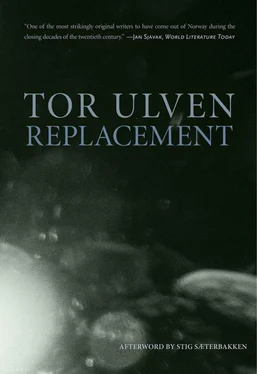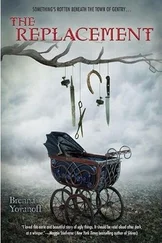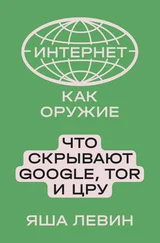You really need a smoke. Unfortunately, you remember that you have neither matches nor lighter, and you know it won’t do any good, but you go into the kitchen to have a look around. To your surprise, you see that one of the burners on the stove has changed from a rusty gray to a bright yellow-red. Hmm. Without turning it off, you spread your fingers and reach toward the glowing circle until your hand is hovering only a few millimeters above the surface, and you feel the heat scorch your palm and the underside of your fingers, until the pain grows stronger than your will. You shake your hand and blow on it a couple of times, before fishing a cigarette (one of the unsmashed ones) out of the crumpled pack, placing it between your lips and bending over until the end of the cigarette touches the burner (and you feel the heat again, this time against your face), at the same time taking a few quick puffs until both tobacco and paper are burning, and you can feel the bitter smoke enter your lungs, first in short, stingy pulls and then in longer drags, you hold the cigarette up and examine its glowing tip, good enough, you turn off the burner but you remain standing there, spellbound by the glowing metal disc, which looks as though it should be flowing (like the images you’ve seen of molten metal flowing like orange juice in a smelter), but at the same time it seems thick and syrupy, a wheel of molten metal, a flat, red sun, metallically glinting through passing clouds, now covered, now visible, with an unreadable inscription, like a worn copper coin from a long-dead empire. Sunset, but still daytime, you’d gone to the last stop on the line to meet someone (you’ve forgotten who), and that person wasn’t there, and then the trolley had arrived, making a last loop and coming to a shuddering halt, as the tin cans tied to its bumper had stopped their rattling. And then everything was still.
The trolley was black, and it looked like it had been through a fire or an explosion or maybe both, a wreck with no real route, but with a red cross on the door, and then the doors had opened (the red cross had folded back and disappeared) and out had stepped a short, stocky, bareheaded (and bald) little man dressed in a shabby overcoat; his fingers sparkled with large rings showcasing various small gems. You thought he looked threatening, and you tensed yourself for a fight, but upon closer inspection, you decided that his face was actually warm, gentle, and a little sad. Rings sparkling, he’d approached you and asked in an encouraging tone, Are you looking for someone? and, suddenly uncertain, you answered, Yes, but she’s not here, there must’ve been some misunderstanding, I don’t think either the clock or her heart works at night (it was suddenly night) and he said, Don’t worry about that, that’s not the reason you’re here, that was just an excuse; no, what you’ve got to understand is that meaning can be found in meaninglessness, and that these meaningless words hold all you need to know. Then he turned and vomited all over the platform. After that, he climbed back into the disfigured trolley, the doors closed (you noticed that the red cross was now a skull), and the trolley had descended toward the city and disappeared.
It’s not your first step off the bus but your second that finds the ice, though it’s crushed, of course, since it’s pretty late in the day and plenty of people have visited this stop in the meantime (and one, or rather many of them have one by one crunched their way over the crisp autumn ice covering the puddle’s surface); all that’s left is a crusty, dull, sugarlike coating around the edges, but it still crunches beneath your weight. You’d have thought the puddle ice would surely melt during the day, but obviously it didn’t, which, you think, is a definite sign of late fall, early winter. You reach up to tighten your scarf, but find you don’t have a scarf. Your tie doesn’t help at all. As a result, your throat is doomed to stay cold on your walk across the big, mostly empty parking lot (it’s nearly always empty, you don’t know why it’s even here, every now and then it gets used by a driving school, which sets up a row of blinking plastic cones that look like witch hats for future motorists to drive slalom through at a slow, almost walking pace). The lot seems bigger than usual. Cold increases distance, you think; the colder you are, the farther you’ve got to go. Enormous rayon brushes, like electric, Brobdingnagian dish scrubbers, are separated into festive colors: yellow, red, blue, black, though now they’re hanging idle, a fact you observe on your route past the car wash. Although the sliding glass doors leading into the garage are also closed, you see a couple of mechanics inside, one bends over and points with a tool, the other makes a dismissive gesture. It’s not snowing yet.
Still, every ape, every goat, every frog is conceived and born, every one of them started out as a clump of cells, a little gob of life, you don’t have to be mammalian to begin life as a clump of cells, you think, continuing your train of thought, everything’s conceived and born unmetaphysically, in the most vulgar biological way possible, ergo, on the most basic level, there’s nothing separating a human being’s conception and birth from, say, an ape’s, or a goat’s, or a frog’s. (Animals are only interesting to you insofar as they can be used as examples in this argument.) Furthermore (and this is an incontrovertible fact), life has evolved from simple forms to increasingly complex ones over billions of years, though the complex ones are made up of the same basic material as the simple ones, they’re made up of cells, that is, where life, so to speak, is housed, and to make a long story short, you think, everything that now exists came from something that existed before, every complicated life-form from simpler life-forms, all intelligent life from unintelligent life. Given that apelike creatures, the so-called primates, emerged along with other mammals after a good hundred million years had passed, you summarize to yourself, while you see (without seeing) a stack of motor-oil cans (SALE ON OIL), and these primates developed into primitive man, and these into modern men (physiologically speaking), one encounters a real brainteaser, namely: when, at what stage was the immortal soul suddenly and without warning implanted, or better yet, injected by divine syringe into human beings, probably into their brains; at what stage in the evolutionary game did this happen, since evolution implies biological continuity? On the other hand, if the soul wasn’t suddenly, miraculously injected into the more or less apelike, mortal human body, then how can the soul be free and immortal, if, that is, it evolved with brain cells? At exactly what point did human beings become immortal? Is Homo sapiens neanderthalensis , for example, doomed to bite the big one for all time like any hyena or louse, while Homo sapiens sapiens has divine, immortal substance and will enjoy eternal life? Therefore, you conclude (once again), human beings don’t have immortal souls, it’s flat-out impossible, which means she can’t be in hell.
To you, a gas station is a foreign country. You’ve never learned to drive so-called motor vehicles, and if you don’t actually enter the gas station as an illegal alien, you certainly do so as a rather nervous guest (you remember with discomfort the time someone asked you, even though you were only a passenger, to put gas in their car; you didn’t even know how to hang the nozzle, or whatever it’s called, back on the pump, it wouldn’t fit, and you just stood there holding it, like it was some kind of exotic life-form, feeling ridiculous). Once you’re inside the store, you’re on more solid ground. You know you don’t want hubcaps, windshield wipers, sponges, ice scrapers, first-aid kits, warning triangles, chains, battery chargers, roof racks, rear-view mirrors, seat covers, window shades, steering-wheel locks, gas cans, jacks, or exhaust-pipe repair kits, hell no, but you also don’t want milk, porno mags, Phillips screwdrivers, Swiss cheese, boxes of chocolate, applesauce, backsaws, ice cream, tiger-striped lap rugs, badminton sets, comic books, key rings, ballpoint pens, coffee mugs, adhesive yellow letters, flashlights, rice cream, clamps, oranges, snuff, baseball caps, or breath mints. You walk up to the cash register and get in line. You see (without seeing) a shelf with chewing tobacco, and while you wait you decide (once again) that you don’t believe that dreams contain any signs or portents, although you can’t get the fat man’s dictum out of your head, which can be interpreted in two contradictory ways, namely, 1) that once things are gone, they’re gone, and that once people are dead, they’re dead, and that what’s dead and gone is beyond all meaning, and has, therefore, entered into the realm of the meaningless, and therein lies the solution to the problem; or else 2) that the most absurd, most meaningless thing a person can dream up is that there actually is such a thing as an immortal soul and that that soul can go to hell.
Читать дальше












